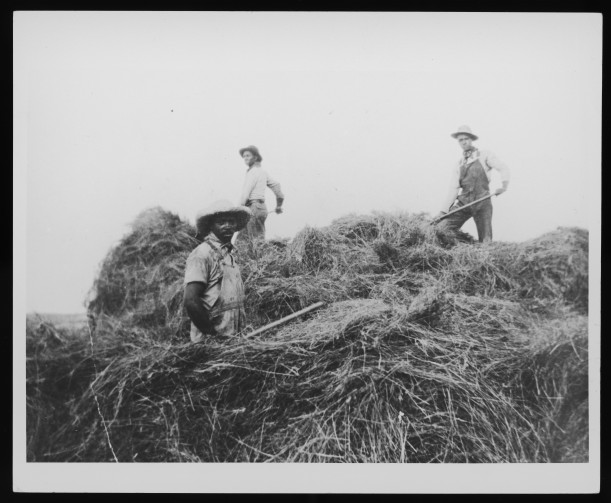Dewitty Became ‘Springboard’ for State's Black Homesteaders

Dewitty residents, from left, Edward, Robert and Glenn Hannahs, work a load of hay. Dewitty, Nebraska’s main Black homesteader settlement, located near Valentine, reached roughly 150 people in the early 20th century before all but disappearing in the 1920s. (History Nebraska via Flatwater Free Press)
Nebraska homesteaders were poor and poorer, Catholic and Protestant, European and American. And almost uniformly white.
Except for the homesteaders who settled in a place called Dewitty, near present day Valentine.
These homesteaders were Black. Some came from the South, lured by the promise of the 1904 Kinkaid Act – a kind of second version of the Homestead Act – that promised 640 acres of free land in the Nebraska Sandhills. Some came from Canada, where they had escaped to decades earlier. And some moved from Overton, near Kearney.
Many of the original homesteaders had survived the horrors of slavery. So yes, they could figure out how to grow some crops in the drought-prone Nebraska Sandhills. There were roughly 150 residents of Dewitty by 1915.
“Dewitty is a story about what’s possible here,” said Mikal Eckstrom, a professor at UNL’s Great Plains Studies who has studied the settlement. “It’s a story about the realities of rural life then, the difficulties, yes, but also…Dewitty was a place where families came to stake their claim. To provide a platform for their children. It was a springboard.”
The residents of Dewitty grew corn, potatoes, oats. They grew sorghum and turned it into molasses. They built churches, a general store, a post office and a school that some nearby white children attended, too.
They celebrated the 4th of July with nearby Brownlee, the nearest white settlement, which still exists as an unincorporated town.The two towns played baseball against one another. They held dances.
“Let’s be clear about this: They danced in the same space, but that didn’t mean that African American and white homesteaders were dancing with one another,” Eckstrom said.
The residents of Dewitty never meant to stay forever, Eckstorm said. They meant to build a better life, and go somewhere new. The settlement had all but vanished by the mid-1920s, done in by weather and plummeting crop prices in 1921. The residents also faced several problems that white homesteaders didn’t.
One: The sons and daughters of original Dewitty homesteaders had a hard time finding marital partners, since inter-racial marriage was then illegal.
Two: It wasn’t easy to get a loan as a Black man in Nebraska in the early 20th century.
The residents of Dewitty did leave. Today its descendants are spread out over the country, many of them attributing some success to their grandparents or great grandparents who homesteaded in the Sandhills town.
But what the residents of Dewitty did leave in Nebraska, Eckstorm thinks, what stayed here even after the Black homesteader community vanished, is the potential for eye-opening things to happen in seemingly unlikely places.
Where, when largely left to their own devices, Nebraskans, then and now, can do something incredible.
“The whole mythos of the opening of the West was called Manifest Destiny, and it was encoded in a way that it really meant it was a space for white immigrants,” he said.
“Except (the residents of Dewitty) manifested destiny in a way that included them. They fought and wrote to the Secretary of the Interior. They fought for those land claims. They manifested their own destiny.”
This story was originally published by Flatwater Free Press, an independent, nonprofit newsroom focused on investigations and feature stories in Nebraska that matter. Learn more at flatwaterfreepress.org.
Author Profile: Matthew Hansen
User login
Omaha Daily Record
The Daily Record
222 South 72nd Street, Suite 302
Omaha, Nebraska
68114
United States
Tele (402) 345-1303
Fax (402) 345-2351




